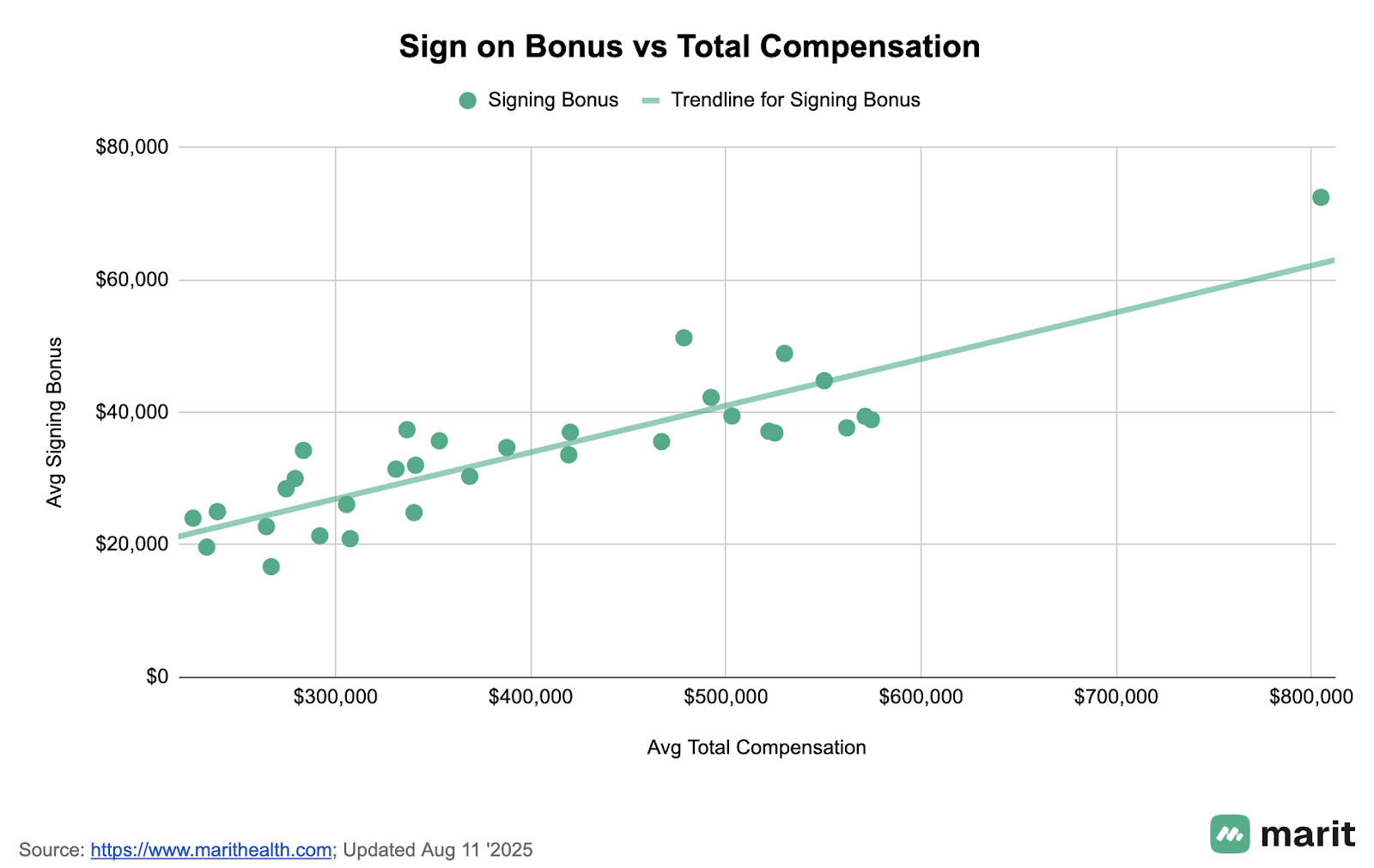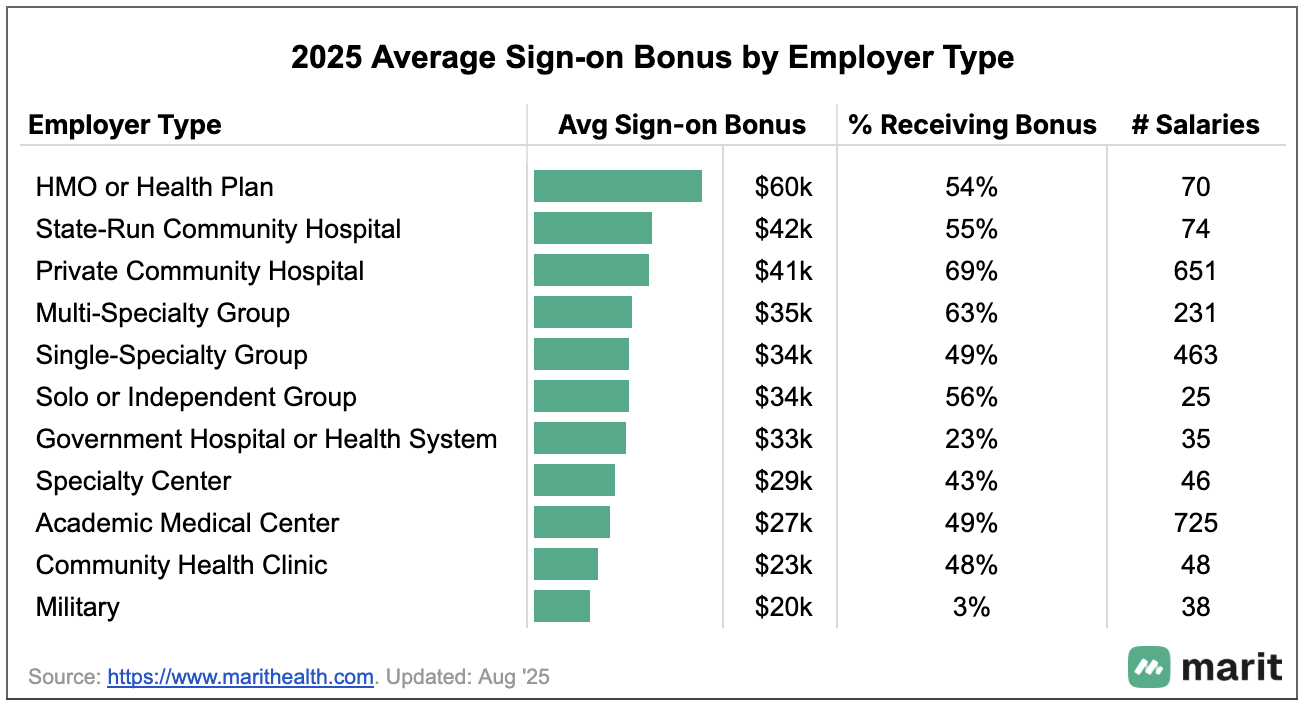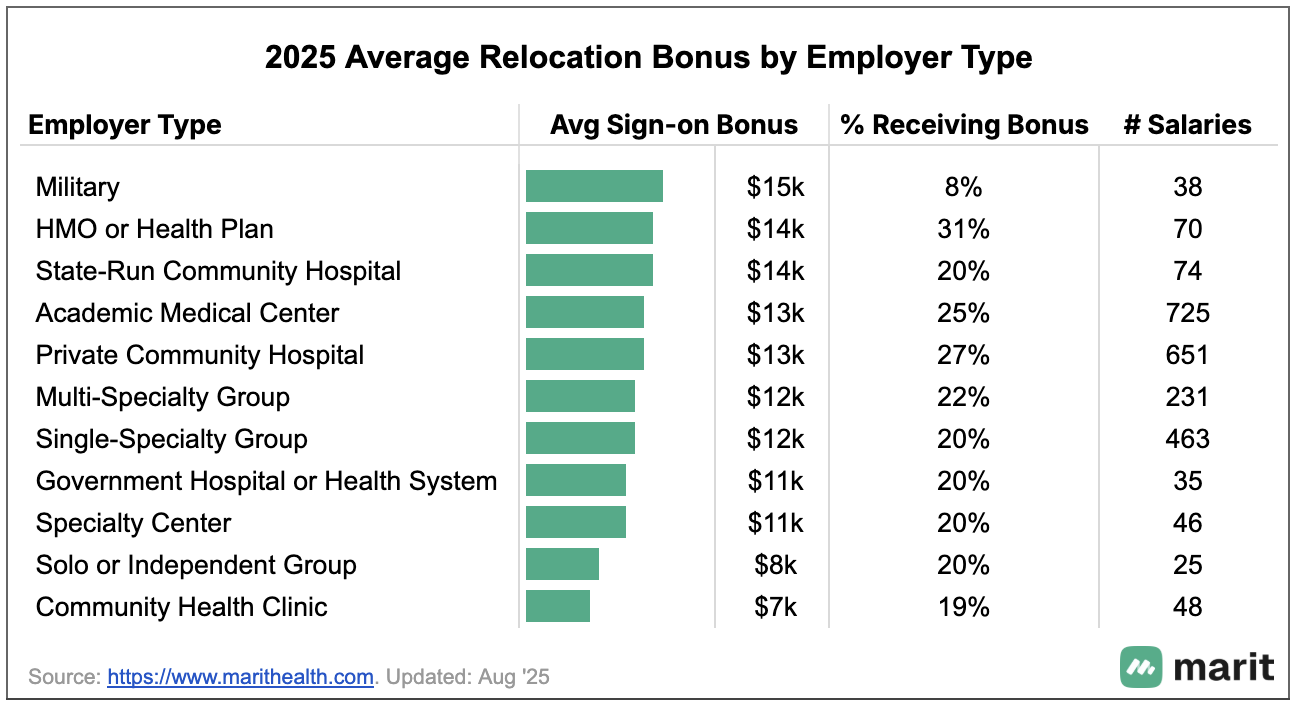Physician Sign-On Bonuses and Relocation Allowances: What New Grads Should Expect in 2025
For many new physicians, the first attending contract comes with more than just base pay. Sign-on and relocation bonuses are common, and in some cases, they can significantly shape the value of your first-year package. While it is easy to view these as “free money,” the reality is more nuanced.
Sign-On Bonuses: How Much Are They Worth?
Based on Marit’s dataset, there is a clear link between total compensation and sign-on amounts. On average, sign-on bonuses can be estimated using the following formula:
Sign-on bonus ≈ $5,700 + 7.1% of total compensation

For example, a new attending earning $400,000 in total compensation might expect a sign-on bonus around $34,000. Actual bonuses vary by specialty, employer type, and geography, but this formula provides a useful benchmark when reviewing offers.
Employer Patterns for Sign-On Bonuses
The likelihood and size of a bonus can vary significantly depending on the type of employer you work for.

HMO and health plan employers top the list with average sign-on bonuses of $60,000, offered to more than half of new grads. These organizations are competing aggressively for physician talent, often in markets with high demand and lower supply.
State-run and private community hospitals are not far behind, averaging around $40,000. These hospitals often face recruitment challenges, particularly in less urban areas, and larger bonuses serve as a lever to attract candidates who may otherwise overlook these opportunities. Multi- and single-specialty groups typically fall in the mid-$30,000s, which is more moderate in scale, but tends to be more reliable and consistent across offers
At the other end of the spectrum, government hospitals and academic medical centers are less likely to offer sign-on incentives. Academic centers, in particular, may lean on mission-driven work, teaching opportunities, or prestige as recruitment tools, which makes them less reliant on large upfront payments. Community health clinics and military positions offer the smallest and least frequent bonuses, reflecting their traditionally standardized pay structures and reliance on benefits like loan forgiveness or pension-style retirement systems rather than cash incentives.
Relocation Allowances: Less Common but Still Valuable
Relocation benefits tell a similar story, though the amounts are smaller and the frequency is lower. On average, only about one in five new grads report receiving relocation support.

HMO and health plan employers again stand out, averaging $14,000 in relocation assistance for nearly a third of new hires. Private and state-run community hospitals offer a similar benefit, with average relocation benefits of around $13,000-$14,000. These employers rely on these allowances to make rural or semi-rural jobs more attractive to physicians who may be weighing multiple offers in more desirable locations.
Academic centers, multi-specialty groups, and government hospitals all offer somewhere in the $11,000 to $13,000 range. These employers often count on stability, research opportunities, or loan repayment as bigger draws than a relocation stipend.
Solo and independent groups, as well as community health clinics, sit at the bottom of the list. With relocation benefits averaging just $7,000-$8,000, these employers may lack the resources of larger systems. They may also be more likely to recruit locally, where moving support is less of a deciding factor.
Military positions are another outlier in the other direction: while just 8% of new grads report receiving relocation assistance, the average amount of $15,000 is relatively generous when it is offered.
Unlike sign-on bonuses, relocation support is almost always structured as reimbursement, requiring physicians to front the costs and submit receipts for eligible expenses. While this makes the benefit less flexible, it can still be meaningful, particularly for new physicians moving long distances, purchasing a home, or relocating with a family.
Tips for New Grads Evaluating Bonuses
- Ask about repayment terms. Nearly all sign-on and relocation bonuses come with a standard payback clause if you leave early. Clarify whether repayment is prorated over time (you owe only the remaining portion) or if it is all-or-nothing (you owe the full amount back if you leave before the end of the term).
- Look for clawback terms. Unlike repayment terms, clawbacks can require repayment even if you do not choose to leave. For example, some contracts require repayment if you are terminated without cause, or they tie forgiveness to signing a renewal contract, which limits your flexibility.
- Confirm timing of payment. A lump sum at the start can be especially helpful if you want to pay down student loans. Bonuses paid in installments may reduce your financial risk but offer less upfront relief.
- Watch for tax withholdings. Large lump-sum bonuses often have significant withholdings taken out before you ever see the money. Ask what your actual take-home amount will be.
- Clarify relocation rules. Relocation support is often structured as reimbursement. Ask what qualifies (moving trucks, realtor fees, temporary housing) and what documentation you’ll need to submit.
- Check forgiveness schedules. Some employers don’t prorate forgiveness over time. Instead, they require you to complete the full contract term before the bonus is considered “earned.”
- Don’t undervalue the “extras.” Even modest relocation allowances can offset several thousand dollars in moving costs, freeing up cash flow during the transition out of training.
Conclusion
Sign-on and relocation bonuses can add significant value to a new grad’s first contract, but they are rarely straightforward. Understanding the fine print, knowing what is typical for your employer type, and asking the right questions can help ensure these incentives truly support your career and financial goals.
In the third and final installment of our blog series for new grads, we’ll look beyond the first contract to explore how physician compensation grows over time and why some specialties see much faster salary acceleration than others.


